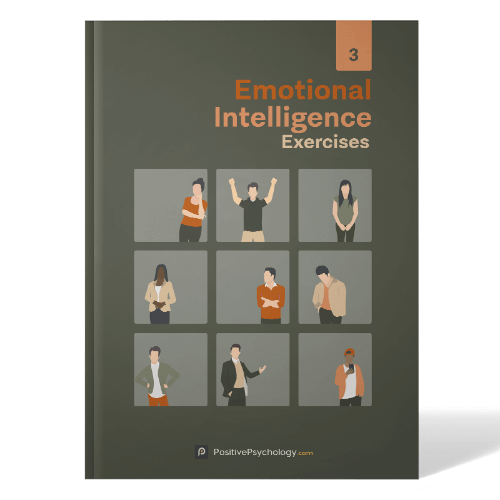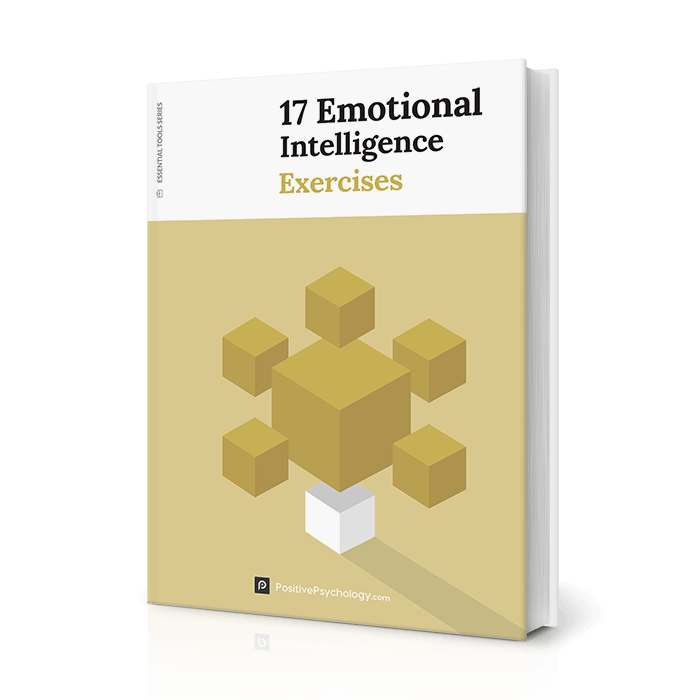Your Anger Management Guide: Best Techniques & Exercises
 Maybe you have a no-nonsense approach to life, or perhaps you are just angry.
Maybe you have a no-nonsense approach to life, or perhaps you are just angry.
“Pathological anger can ruin your relationships, career, and health if you don’t take action,” but there are techniques that can help (Dyer, 2020, p. 14).
We know that everyone gets angry, but letting it get out of control is harmful. Anger management treatment helps people lead a full, happy, and healthy life (Karmin, 2017).
This article provides tips, techniques, and strategies taken from anger management therapy. It also introduces exercises and activities to take charge of emotions and keep anger under control.
Before you continue, we thought you might like to download our three Emotional Intelligence Exercises for free. These science-based exercises will not only enhance your ability to understand and work with your anger emotions, but also give you the tools to foster the emotional intelligence of your clients, students, or employees.
This Article Contains:
Conducting Anger Management Therapy: 10+ Tips
We don’t have to accept destructive anger-driven behavior, and, perhaps more importantly, neither should others. There is a wealth of literature and advice available to regain control of our emotions.
Anger is a real problem in society. Studies suggest that “eight percent of the adult population find it hard to control their temper,” and any of us can develop an anger problem (Dyer, 2020, p. 14).
There are, however, several tips that can start or keep us on the path to managing our emotions, before considering signing up for anger management therapy.
We’ve included some of the best below (modified from Dyer, 2020).
Identify if you have an anger problem
While a degree of anger is normal and at times helpful in our lives, we need to ask ourselves if we get consumed by rage. For example, do we lose control when we feel disrespected or see someone else treated poorly?
Key indications of a serious anger problem include the following (Dyer, 2020):
- Your anger feels too strong to handle.
- You are angry regularly.
- You get angry over things that don’t seem to affect other people.
- Your anger affects your relationships and work.
- Your anger turns to aggression or violence.
- You engage in unhealthy coping mechanisms to handle your behavior.
Recognizing there is a problem is the first step toward change (Karmin, 2017).
Learn to cope with your emotions
Finding techniques that help you cope with strong emotions and break the anger cycle is an essential next step in anger management (Dyer, 2020).
Out-of-control anger means that your emotions are dictating your behavior. Dyer (2020) offers several techniques to regain mastery over feelings and avoid acting in a destructive or harmful way.
- Distance yourself
Physically removing yourself from an emotional situation can immediately bring relief. However, if that’s not possible, psychological distance can help. Imagining someone else experiencing the problem or looking in on yourself can help you respond more rationally. - Practice deep breathing
Breathing slowly and deeply is a powerful method for restoring logical, less emotional thinking and encouraging feelings of relaxation (Nestor, 2020). - Ask for time out
Before you do or say something regrettable, excuse yourself. Get a few minutes away from the heat of the situation to regain composure and more logical thinking. - Engage in physical activity
In the heat of anger, your body is on fire with endorphins and stress hormones that prepare you for action. Take a walk, ideally outside, to restore physical (as well as mental) balance. - Change your posture and facial expression
Surprisingly, altering your body language can be effective at changing how others see you and how you feel. Relaxing your arms and shoulders and unclenching your fists can help (Cuddy, 2018). - Laugh
If you can see the humor in the situation and it’s appropriate, laughter can create a temporary distraction or change a tense dynamic. - Play calming or happy music
Listening to bright or relaxing music can be distracting and an effective way to decompress.
Seek medical help
Physical illness and physiological changes can cause emotional shifts. Seek medical help for severe mood swings and unexpected anger (Dyer, 2020; U.S. National Library of Medicine, 2021).
Medical assessments for these types of symptoms may include running tests, asking about, or discussing the possibility of:
- Hormonal imbalances
- Blood sugar problems and diabetes
- Neurological issues
- Eating disorders
- Depression
- Addiction
- Family history of mental health
- Handling stress (recent significant changes in life, such as divorce, death of a loved one)
- Organic diseases (Parkinson’s, epilepsy, tumors, etc.)
- Head injury
While none of these factors are excuses for lashing out at others, they may suggest underlying factors worsening the situation.
Develop the skills to manage anger
The goal of managing your anger is to avoid saying or doing things that you will later regret. Managing your anger involves developing the skills necessary to successfully (Karmin, 2017):
- Express yourself
- Take care of yourself
- Build resilience and tolerance regarding frustration
- Maintain a positive outlook
Ask yourself, what is the hardest part of managing your anger when you are:
- Expressing yourself?
- Taking care of yourself?
- Tolerating frustration?
- Maintaining a positive outlook?
Use the answers to reflect on what you could do differently, and learn how to show yourself and others more compassion.
7 Anger Management Techniques & Strategies

Understand the anger management cycle
In Anger Management – How to Take Control of Your Emotions and Find Joy in Life, Judy Dyer (2020) says that once you recognize the factors involved in triggering angry responses, you can learn how to break the anger cycle.
A typical angry response is the result of the following steps (modified from Dyer, 2020):
- Something happens to annoy or upset you (triggering event).
- Negative or irrational thoughts kick in.
- Such thoughts lead to unpleasant emotions.
- You start to experience physical symptoms of anger (hot flash, sweating, shaking, clenched fists).
- You react (behavior), possibly yelling, crying, arguing, lashing out, or withdrawing.
It doesn’t have to be this way. According to Dyer (2020), you can break the cycle.
Challenge your thoughts
Therapists often begin by focusing on a client’s negative thoughts or cognitive distortions (Dyer, 2020).
Ask your clients to consider whether the following statements hold true for them:
- You only focus on things people have done to annoy you (filtering).
- You see everything in the extreme, using words such as never, always, or every (overgeneralization).
- You ignore your role in a situation and blame others instead (blaming).
- You daydream about how you will get even or seek revenge (blueprinting).
- You insist everyone around you acts in a certain way. If they don’t comply, you get angry (should-ing).
Ask your clients to challenge their negative thinking using the following steps (Dyer, 2020):
- Write the thought down.
- Reflect on how you feel when you have this thought.
- Think about the type of cognitive distortion you might be using.
- Identify how fully you accept (believe) this thought on a scale from 1 (not at all) to 10 (completely).
- Identify a more helpful thought to reframe the situation.
Consider,
What advice would you give to a friend?
What supporting evidence do you have?
Is this a helpful thought?
What will you think in a week/month/year?
- Re-score how fully you accept this new thought, from 1 (not at all) to 10 (completely).
If the score is less than five, come up with a new thought.
- How does it feel to hold on to this new thought?
Perhaps you feel less angry, lighter, and calmer.
When you next get angry, notice your thoughts. Are they cognitive distortions or negative thoughts? Could you replace them?
Anger in relationships
“Angry people often have angry relationships” says Dyer (2020, p. 53).
Over time, both partners can fall into a pattern of habitual anger unless the anger cycle is shut down. Instead, try to share one another’s needs and wants, and address issues as they arise.
Dyer (2020) suggests the following strategies:
- Take a step back
Imagine someone else in your situation. How would you advise them? - Reframe the situation
When your partner lets you down (perhaps they forget to go to the store), try a more sympathetic interpretation. Rather than escalate a mistake into something more serious, try reframing it.
Focus on the facts rather than an immediate, emotional reaction. - Use constructive communication
Show respect and maturity when talking to your partner. This includes:- Being honest
- Allowing the other person time and opportunity to share their views
- Using ‘I’ statements when talking about feelings
- Being compassionate
- Working together toward a solution
- Avoiding insults, shouting, unfounded accusations, dragging up the past, and sarcasm
- Seek understanding
Rather than focusing on winning the argument or suggesting that the other person is overreacting, aim for understanding. - Plan for difficult conversations
Write down the points you need to cover, and practice discussing sensitive subjects.
Top 4 Exercises, Activities, & Games for Adults
The following exercises and activities will help you identify, manage, and express your anger or your clients’ in more positive ways. In addition, you will find 15 anger management tests in our related article.
1. Socializing
Fostering relationships is a worthwhile investment. Discussing problems and emotional upsets with friends and relatives can help control and manage emotions.
Not only that, “spending time with friends and acquaintances whose company you enjoy can inoculate you against stress and anger” (Catalano, 2018, p. 117).
2. Exercise and sports
Sports and exercise help manage anger and control emotions (Pels & Kleinert, 2016).
Walking, running, and gardening are effective at lowering anxiety levels, improving mood, and offering protection from stress and irritability (Catalano, 2018).
3. Eating well
Our microbiome (bacteria in our gut) has a significant impact on our emotional and mental wellbeing. Research shows that gut health is essential to every organ in the body, including the brain (Thomson, 2019).
Eating a healthy, balanced diet can positively affect our cognitive and emotional state (Thomson, 2019).
4. Taking a breath
Deep, slow breathing can have a positive effect on anxiety and depression.
A change to our breathing pattern, even a temporary one, can increase the blood flow and function of the brain and benefit both our physical and emotional wellbeing (Nestor, 2020).
Useful Worksheets and Helpful Questions

Once these triggers have been identified, it is possible to avoid them, reduce their effect, or find ways to maintain emotional control (Dyer, 2020).
The following questions and exercise worksheets can help.
Anger Management Journal
Understanding your history with anger can provide valuable insights into what triggers outbursts or damaging behavior (Karmin, 2017).
The questions in the Anger Management Journal prompt you to consider what happened, how you reacted angrily, and how you could have done things differently.
Once you have captured several incidents of anger, you can begin to identify patterns and plan coping mechanisms to use in the future.
Tuning In to Your Anger
The better you understand your anger, the more likely you are to manage your feelings and behavior, and cope with your emotions (Karmin, 2017).
The Tuning In to Your Anger worksheet asks a series of questions to understand the physical, emotional, and behavioral signs of anger.
The answers can improve your awareness of rising extreme emotions, such as anger.
Challenging Angry Thoughts
“Distorted thinking involves thoughts that flash into your mind and make you feel worse” (Karmin, 2017). We all have them, and they are particularly relevant leading up to or during angry outbursts.
The Challenging Angry Thoughts worksheet explores whether you are making errors in how you interpret situations and helps you identify recurring patterns in your thinking.
The answers can help you recognize that your thinking patterns are sometimes distorted and explore how you could interpret them differently and more positively.
Imagining Being Able to Manage Anger
Anger management can be learned. Using suitable techniques, individuals will become better at identifying their anger triggers and implementing coping mechanisms. Clients can bring their anger under control.
Use the Imagining Being Able to Manage Anger worksheet to picture how life would be if you were able to get a grip on your anger.
The following questions form the acronym FADE (Catalano, 2018):
- Feel
Imagine how you will feel emotionally and physically when you can manage your anger. - Appear
Imagine how you will appear differently when you can manage your anger. - Do
Imagine what you will do differently when you can manage your anger. - Empower
Imagine what you will be empowered to do when you can manage your anger.
The worksheet can be kept and reviewed as a reminder of the client’s goals for managing anger and how their life will look when they gain that control.
Releasing Resentment
Resentment can be another path to anger (Catalano, 2018)
Using the Releasing Resentment worksheet, respond to a series of prompts to reflect on the resentment you may be harboring and explore what it might be like if it were released.
Improving the client’s understanding of factors that fuel their anger can help them become aware of and manage the triggers.
Spot-check of Your Anger
Sometimes we are unaware of our anger and may fail to notice it building within us.
Use the Spot-check of Your Anger worksheet to review your anger, bring feelings into focus, and consider the actions you need to take.
Anger management techniques that work! – Dr. Christian Conte
Alternative Anger Management Methods
There are other ways of identifying the triggers that lead to anger and managing our emotional responses, including the following.
Best anger management apps
Apps promoting mental health are portable and accessible, and can provide valuable interventions at any time.
Here are three of our favorites.
Happify
Happify offers evidence-based solutions for handling stress and life’s challenges. This app helps users improve their mental wellbeing and manage anger by forming new, healthy habits.
Headspace
Headspace is a top-rated app that successfully promotes mindfulness and meditation skills. Such techniques are highly effective at gaining composure and objectively looking at our emotions, including anger.
Calm
Calm is another highly valued app that can reduce stress and anxiety by adopting a calm outlook in challenging situations. Use the tool to balance life, manage stress, understand related emotions, and adopt a more positive, healthy outlook.
Yoga
Yoga is one of the most widely practiced alternative treatments in the United States and has been linked to several health benefits, including alleviating asthma and depression (Brown, Eubanks, & Keating, 2017).
Brown et al. (2017) confirmed the benefits of practicing yoga for improving relaxation, quality of life, and anger management.
Anger management journals
Journaling is a well-used and valuable component of many therapy treatments (Myles & Shafran, 2015). Whether using a paper journal or digital apps, capturing and tracking the triggers and incidents of anger is a valuable and powerful technique for gaining emotional control and self-knowledge (Karmin, 2017).
Best Resources From PositivePsychology.com
Throughout our blog, we have many practical tools to help clients better manage emotions and maintain a calm outlook when it’s most needed.
For instance, take a look at the following free materials:
- Imagery-Based Exposure Worksheet
This worksheet invites clients to visualize and re-experience strong negative emotions produced by a difficult event to help reduce the power that situation or memory holds. - Understanding My Anger
This worksheet presents a series of questions and reflections to help with anger management for teenagers to understand the triggers, feelings, and consequences associated with anger. - Decatastrophizing Worksheet
This worksheet presents five questions to help clients catch themselves catastrophizing and calmly explore the facts of a situation. - Anger Exit and Re-Entry
This worksheet helps clients recognize when best to disengage from conflict or difficult conversations, cool down, and re-engage later to facilitate greater insight and joint problem-solving. - Impact of My Anger
This worksheet helps clients capture examples of behavior spurred by anger to consider who has been impacted by it and how. - Anger Management Books
Finding just the right book for your needs is made easier with this selection of 14 anger management books.
17 Emotional Intelligence Exercises
If you’re looking for more science-based ways to help others develop emotional intelligence, this collection contains 17 validated EI tools for practitioners. Use them to help others understand and use their emotions to their advantage.
A Take-Home Message
We all get angry, but when it becomes out of control, damaging our relationships at home and work, we need to seek help. Whether it originates in genetics, family background, imitation of others, parenting, or stress, extreme anger can wreck lives (Dyer, 2020).
Anger can become a habit. We end up stuck in a pattern of overreacting to minor issues or handling our emotions poorly (Dyer, 2020).
However, if we can recognize our lack of control as an issue, it is possible to break the anger cycle by identifying triggers that cause us emotional upset.
By slowing down our thinking and examining our thought processes, we can prevent angry thoughts from escalating and restore control.
Changing how we look at the problems we face and recognizing emotions without being consumed by them can break the chain of command between trigger and outburst.
The worksheets and strategies in this article help prevent and manage anger before we lose control. Try them out on yourself or with clients to see when each one is most effective.
We hope you enjoyed reading this article. Don’t forget to download our three Emotional Intelligence Exercises for free.
- Brown, J. L., Eubanks, C., & Keating, A. (2017). Yoga, quality of life, anxiety, and trauma in low-income adults with mental illness: A mixed-methods study. Social Work in Mental Health, 15(3), 308–330.
- Catalano, J. (2018). The anger management workbook for women: 5-Step guide to managing your emotions and breaking the cycle of anger. Althea Press.
- Cuddy, A. J. (2018). Presence: Bringing your boldest self to your biggest challenges. Little, Brown Spark.
- Dyer, J. (2020). Anger management: How to take control of your emotions and find joy in life. Pristine.
- Karmin, A. (2017). Anger management workbook for men: Take control of your anger and master your emotions. Althea Press.
- Myles, P., & Shafran, R. (2015). The CBT handbook: A comprehensive guide to using CBT to overcome depression, anxiety and anger. Robinson.
- Nestor, J. (2020). Breath: The new science of a lost art. Penguin Books.
- Pels, F., & Kleinert, J. (2016). Does exercise reduce aggressive feelings? An experiment examining the influence of movement type and social task conditions on testiness and anger reduction. Perceptual and Motor Skills, 122(3), 971–987.
- Thomson, H. (2019, September 4). Healthy gut, happy mind: What to eat to boost how you feel. New Scientist. Retrieved May 29, 2021, from https://www.newscientist.com/article/mg24332460-600-healthy-gut-happy-mind-what-to-eat-to-boost-how-you-feel/
- U.S. National Library of Medicine. (2021). Mental health screening. MedlinePlus. Retrieved May 29, 2021, from https://medlineplus.gov/lab-tests/mental-health-screening/
Let us know your thoughts
Read other articles by their category
- Body & Brain (50)
- Coaching & Application (57)
- Compassion (26)
- Counseling (51)
- Emotional Intelligence (24)
- Gratitude (18)
- Grief & Bereavement (21)
- Happiness & SWB (40)
- Meaning & Values (26)
- Meditation (20)
- Mindfulness (45)
- Motivation & Goals (45)
- Optimism & Mindset (34)
- Positive CBT (29)
- Positive Communication (20)
- Positive Education (47)
- Positive Emotions (33)
- Positive Leadership (18)
- Positive Parenting (4)
- Positive Psychology (33)
- Positive Workplace (37)
- Productivity (17)
- Relationships (46)
- Resilience & Coping (38)
- Self Awareness (21)
- Self Esteem (38)
- Strengths & Virtues (32)
- Stress & Burnout Prevention (34)
- Theory & Books (46)
- Therapy Exercises (37)
- Types of Therapy (64)








What our readers think
Thank you
nice post
Jeremy,
I study umbrella of…..Narcissim Sociopathy & Psychopathy
A- they are angry people & some addicted so impulsive before and worse with Addiction as any would be ….
B- Sometimes they are so subtly aggressive, the VICTIMS DO NOT even notice “PROJECTION” that is going on….and VICTIMS get angry …as demeaned or lied to or blamed shamed ……………………………..but the ABUSE called PM PSYCH Manip is very bad and researchers know factually IS INCREASING. HINT- CHANGE WORDS and VICTIMS can do SAME STRATEGIES ………….and YOUR WORKSHEETS will HELP VICTIMS,…ie take a break- leave room – space people & ……..these 3 types are somewhat SADISTIC, so want YOU LOW ANGRY like them THEY prey on kind hearted people…….and sometimes save anger for families while are COMMUNALLY REGARDED as they like isolate to abuse. HAVE VICTIMS
“BUDDY-UP! Best WISHES Marilyn in Maine USA
Thank you very much. This article has really helped me to understand and manage anger emotions. I would like to have another input or take the course on anger management.
Hi Esther,
So glad you enjoyed the post. If you’re interested in learning more about anger management, definitely take a look at some of the courses on offer through Udemy as there appear to be a lot of highly rated options. We also offer a Masterclass on the broader topic of Emotional Intelligence, which will look at the topic of anger in relation to the full spectrum of emotions in ourselves and others.
– Nicole | Community Manager
I absolutely love these Dr. Sutton! Keep them coming. They seem to always arrived lined up to something I’m just about to explore because of things I might be up against with clients. Timing is right on. Funny how that works each time.
It is very useful reading.I tend to get angry too quickly which I feel is not good & I have to overcome the same. Could be because of my Bipolar issue also.
Thank you so much for this article. I have so many client struggling with Anger and as a new clinician I never know where to begin. This article will help me to prioritize my topics and provide necessary education and resources. As soon as I save my pennies I plan to purchase the tool box. Let me know if there are any discounts to veterans. Every little bit helps.
Thank you for this insightful read on Anger. It is very useful
Great information! I will use it in my field.